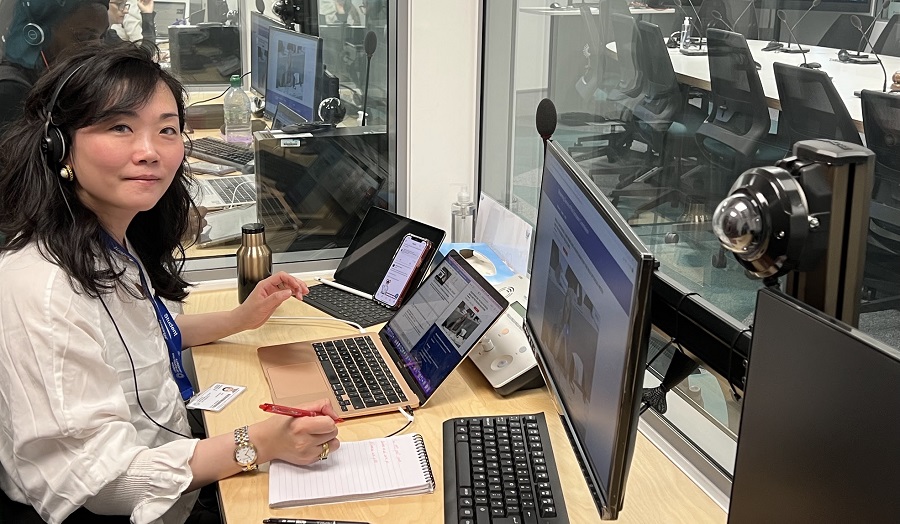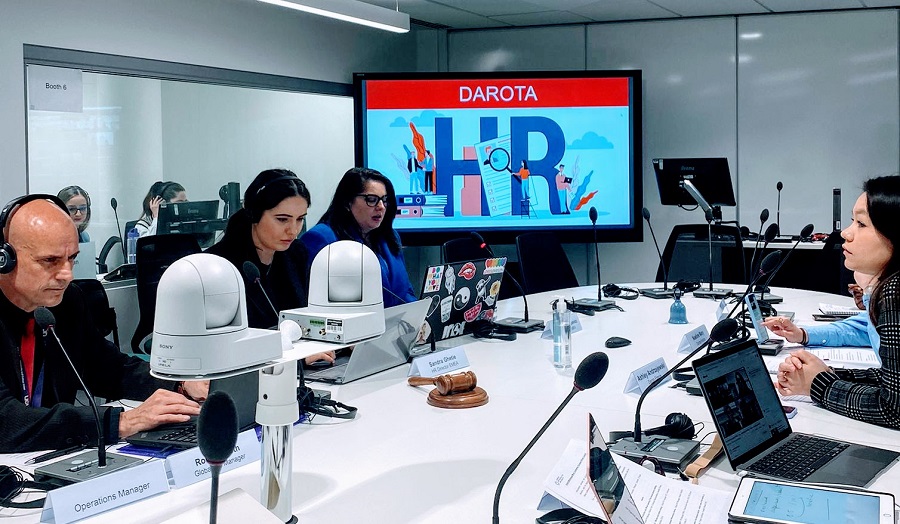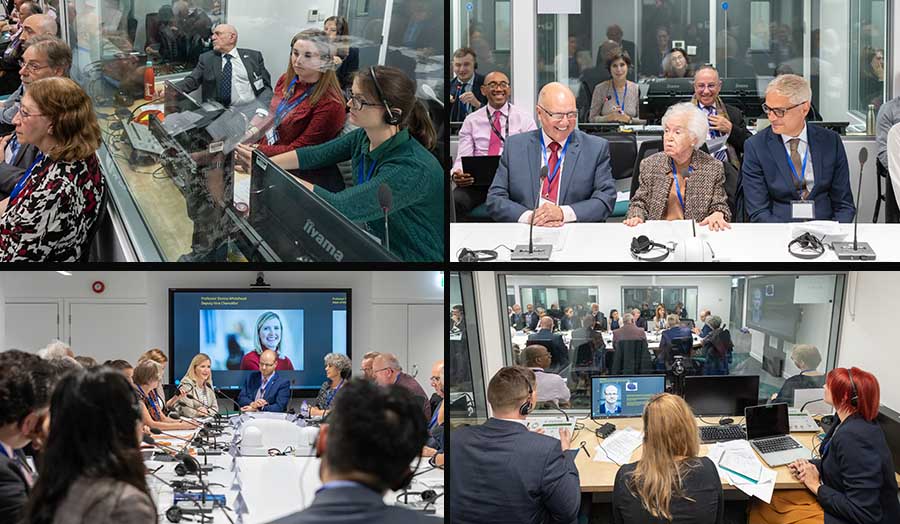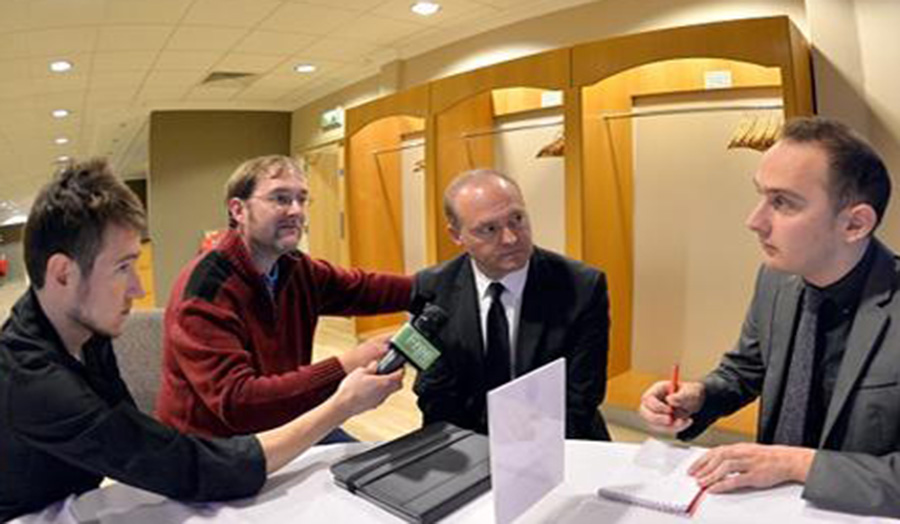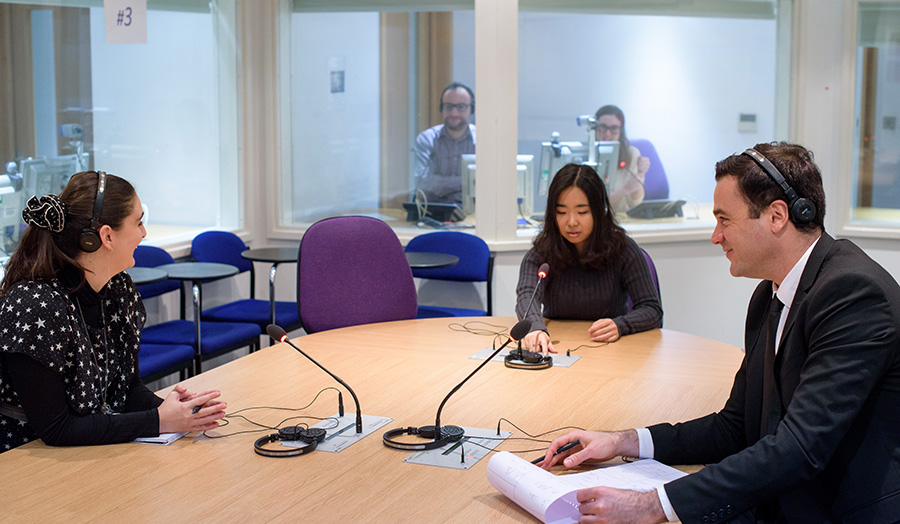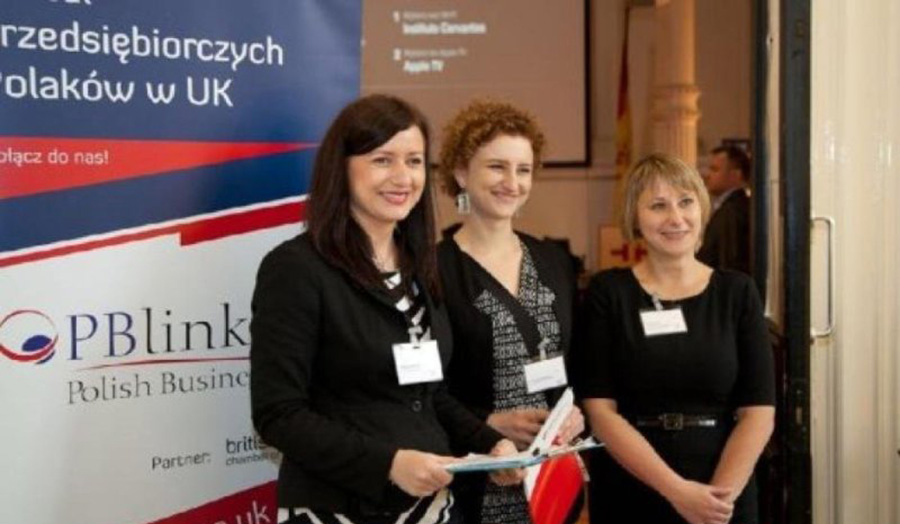Apply for this course
Please select when you would like to start:
Use the apply button to begin your application.
If you require a Student visa and wish to study a postgraduate course on a part-time basis, please read our how to apply information for international students to ensure you have all the details you need about the application process.
Why study this course?
Get ready for a role as a professional interpreter in international organisations, the private market and public services operating under English law.
You can study this course in the following languages, all paired with English: Arabic, French, German, Italian, Japanese, Mandarin, Polish, Portuguese, Russian and Spanish.
This course provides tuition in conference interpreting and public service interpreting (PSI) relating to English law. If you are solely interested in conference interpreting, our Conference Interpreting PG Dip or Conference Interpreting MA provide a dedicated conference interpreting training for the European Union and United Nations context. Instead, this course offers a public service interpreting (English law) module.
This course offers a distance learning option for full tume (one year) and part time (two years) students. Students from both courses are taught together synchronous hybrid mode as one community of learners.
Choose from a wide variety of languages
Languages offered include English, French, German, Italian, Japanese, Polish, Russian, Spanish and more
Make use of our cutting-edge facilities
We’ve got a state-of-the-art interpreting suite that has the same technology as top international institutions such as the EU and UN, and you can also practise legal public service interpreting (PSI) in our mock courtroom
Benefit from extra-curricular activities
Outside the classroom, you’ll have opportunities to go on guided trips and travel to institutions outside the UK such as the United Nations in Geneva and the Court of Justice at the European Commission in Luxembourg
Course modules
The modules listed below are for the academic year 2024/25 and represent the course modules at this time. Modules and module details (including, but not limited to, location and time) are subject to change over time.
Year modules
Consecutive interpreting (A into English or C2 into English)
This module currently runs:autumn semester - Monday morning
autumn semester - Monday morning
(core, 20 credits)
This module aims at developing reflective interpreting practitioners who are able to use an array of key skills strategies required to perform long consecutive interpreting (6 mn) with the following language combinations:
- Non- English native students: from mother tongue (A language) into English (B language);
- English native students: from 2nd passive language (C language) into English (A Language).
This is a highly practical module based on the experiential learning model.
Interpreting into a B language requires different techniques, decisions and skills compared to interpreting into a mother tongue (A language). This module offers the opportunity for students to apply adapted skills, tools and techniques such as reformulation skills, efficient communication skills and adapted note taking skills to the new language combination practised.
With the guidance of a team of tutors who are experienced conference interpreters, students will gradually build up the skills required to perform well in consecutive interpreting in the language combination mentioned above.
This module is aligned with module TR7093. It follows the same pace to develop skills and practice, which are:
- memory skills
- note taking skills
- communications skills (verbal and non- verbal)
- synthesising
- public speaking skills
- speech analysis
- speech writing with oral delivery
- anticipation skills
- confidence enhancement
The module includes English enhancement strategies to help reformulation into a B language (English). It includes sight translations, text analysis, and reformulation techniques.
The backdrop of the module focuses on three defined topics that reflect potential interpreting assignments on the market. The three topics will be constructed on contributions from students. They will research, discuss and present contributions relevant to their national, cultural and linguistic identity. The languages offered on the course are English paired up with Arabic, Chinese, French, German, Italian, Japanese, Polish, and Spanish.
This diversity encourages students to get familiar with a wide range of political, societal, economic and environmental features of the three selected topics. They will research these topics and use them to create speeches they will use for interpreting practice. Students will develop a portfolio of practice.
This module is aligned with module TR793 which teaches students to adopt the appropriate strategies to prepare an interpreting assignment. It will be used to prepare for the three mock conferences that introduce students to the professional settings of interpreting. Students will have to demonstrate how they interpret under pressure in a simulated professional environment.
Furthermore, students will use the latest technology required for note taking skills, recording audio and video materials and uploading them on their own YouTube channel. This includes technology developed to practise interpreting online (synchronous and asynchronous) individually or in groups.
Module Aims: In this module:
1. you will learn to interpret consecutively in the dedicated language combination for 6 mn with notes;
2. you will develop strategies to interpret into English as a B language (non English native students) or from a second C language into English (English native students);
3. you will learn how to make decisions fast whilst interpreting under pressure in a simulated event;
4. you will develop a reflective approach to your own interpreting performance;
5. you will get acquainted three relevant topics that are of professional interest for interpreters;
6. you will develop a collaborative approach to enhance deliberate interpreting practice.
Consecutive interpreting (English into A, or C1 into English)
This module currently runs:autumn semester - Tuesday morning
autumn semester - Tuesday morning
(core, 20 credits)
This module aims at developing reflective interpreting practitioners who are able to use an array of key skills strategies required to perform long consecutive interpreting (6 mins) with the following language combinations:
- Non - English native students: from English (B language) into mother tongue (A language);
- English native students: from 1st passive language (C language) into English (A Language).
This is a highly practical module based on the experiential learning model. With the guidance of a team of tutors who are experienced conference interpreters, students will gradually build up the skills required to perform well in consecutive interpreting, such as:
- memory skills
- note taking skills
- communications skills (verbal and nonverbal)
- synthesising
- public speaking skills
- speech analysis
- speech writing with oral delivery
- anticipation skills
- confidence enhancement
The backdrop of the module focuses on current affairs relating to the countries that are represented by the students' national, cultural and linguistic identity. The languages offered on the course are English paired up with Arabic, Chinese, French, German, Italian, Japanese, Polish, and Spanish.
This diversity encourages students to get familiar with a wide range of political, societal, economic and environmental topics. They will research these topics and use them to create speeches they will use for interpreting practice. Students will develop a portfolio of practice.
Furthermore, students will use the latest technology required for note taking skills, recording audio and video materials and uploading them on their own YouTube channel. This includes technology developed to practise interpreting online (synchronous and asynchronous) individually or in groups.
Module Aims: In this module:
1. you will learn to interpret consecutively for 6 mins with notes
2. you will develop the public speaking skills relevant to the professional interpreter
3. you will learn how to make decisions fast whilst interpreting
4. you will develop a reflective approach to your own interpreting performance
5. you will get acquainted with current affairs from a wide range of countries
6. you will develop a collaborative approach to enhance deliberate interpreting practice
Interpreting Theory and Interpreting Assignment Preparation Strategies
This module currently runs:autumn semester - Wednesday morning
autumn semester - Wednesday morning
(core, 20 credits)
This module is divided into two parts.
The first part aims at introducing students to interpreting theories that underpin their practice so they raise their awareness of the relationship between the two. It is an invitation for students to embrace the concept of “practisearchers” (Orlando, 2016) to cross the practice/research divide. Students gradually connect interpreting theories as a way to contribute to their understanding of the interpreting process. Students are then able to use interpreting theories as a reflective tool to analyse their own interpreting performance.
Students gradually get familiar with key scholars and understand the value of their contribution in the field. Students get introduced to research papers from a variety of countries and understand how to apprehend academic contributions critically. They are then able to make connections between scholars, interpreting contexts, and their own interpreting progression.
This reflective approach provides students with an opportunity to think of their own identity as potential researchers, able to identify areas of interests where they can contribute. This gently brings students to think of their dissertation in the second semester. Students then get familiar with scholars in their field of interest. With the help and guidance of peers and tutors, students are then engaged into shaping their reading into a literature review built around potential research questions that will later on inform their dissertation.
The second part of the module is tightly connected to the preparation strategies students need to master to prepare an interpreting assignment. This part of the module is connected to the interpreting practice in the practical modules of the MA Conference Interpreting and the MA Interpreting. The preparation strategies evolve around the following themes:
- exploring what the interpreting assignment is about (the brief);
- engaging in finding relevant bilingual resources that help the interpreter to develop a conceptual understanding of the brief;
- engaging students to strategically extract key terminology from their preparation;
- developing a terminology management system that fits with their needs, using the appropriate technology and software;
- activating new knowledge and terminology required to relieve the cognitive load during the interpreting assignment;
- accessing the terminology fast and efficiently during the interpreting assignment;
- reflecting on the efficiency of the preparation strategies after an interpreting assignment (Mock Conferences from module TR7092) and reviewing new strategies to adopt for the next assignment;
- understanding the technology available to move towards a paperless approach;
- developing collaborative strategies with booth partners to optimise preparation strategies and standardise terminology.
Module Aims:
In this module you will:
for part 1:
- develop a critical understanding of the main interpreting theories and their impact on practice;
- develop your identity as a “practisearcher” and identify an area of interest for your research, based on your reflective practice;
- identify the relevant literature review to support your research interest;
for part 2:
- develop a strategic understanding of the nature of the interpreting assignment and what preparation it entails;
- adopt a strategic approach to researching bilingual materials relevant to the assignment to develop a conceptual and lexical understanding of the assignment;
- engage in a collaborative approach to enhance preparation strategies with your booth partners.
Public Service Interpreting
This module currently runs:spring semester - Friday morning
spring semester - Friday afternoon
spring semester - Friday morning
spring semester - Friday afternoon
(core, 20 credits)
This module is dedicated to public service interpreting, English Law option. It is aligned with the interpreting and sight translation tasks of Diploma in Public Service Interpreting (DPSI), national qualification for the training of public service interpreters. Students who pass this module with 60% get the equivalent of the interpreting and sights translations tasks of the DPSI.
Students will learn how to work as an interpreter in the context of Immigration Services, the Police, the Courts (criminal and civil) and Probation Services. They will explore the context, the dedicated terminology and register, as well as the triad interaction between the service provider, the non English client and the interpreter.
The will practise two modes of interpreting adapted to the context: consecutive interpreting and simultaneous interpreting (whispering). They will also engage with sight translations, using English and an additional language.
Students will engage with the challenges of the communication process during a public service interpreting assignment, such as power imbalance, turn taking, abiding by the code of conduct, maintaining impartiality and confidentiality at all costs.
This module includes generic sessions where the legal system is explained, and language specific practical sessions where students can practise public service interpreting in the legal context.
This module is tightly connected to module TR7051 where the code of conduct and the interpreter’s professional environment dedicated to PSI are explored, discussed and challenged.
Module aims:
- You will acquire a broad knowledge of Public Service Interpreting for the legal system (the courts, the police and the immigration services) and gain an understanding of the interpreting process relevant in these areas;
- You will be made aware of what is needed to interpret competently and ethically in the specific context of Public Service Interpreting;
- You will identify the problems raised in the interpreting process of this particular mode and understand why they occur;
- You will develop knowledge of the interpreting strategies, procedures and techniques used to solve such problems and learn how to use them appropriately;
- You will acquire a critical awareness of the importance of context, register and the speaker's attitude in the interpreting process and the role they play in the decisions and choices made during the interpreting assignment;
- You will support effective communication throughout the interpreting act and intervene as appropriate in a competent fashion when communication breaks down;
Simultaneous interpreting (A<>English , or C1 and C2 into English)
This module currently runs:spring semester - Tuesday morning
spring semester - Tuesday morning
(core, 20 credits)
This module is dedicated to simultaneous interpreting. It aims at developing reflective interpreting practitioners who are able to use an array of key skills strategies and dedicated equipment/technology required to perform simultaneous interpreting (10 mn) face to face and remotely (RSI) with the following language combinations:
- Non English native students: Language A with English, both ways;
- English native students: Two passive languages into English (A)
This is a highly practical module based on the experiential learning model.
This module is the logical progression of TR792 and TR793.
At this stage, students have already benefited from an introduction in simultaneous interpreting which was delivered in the Autumn semester. They have been introduced to the equipment and technology used for simultaneous interpreting for both face to face and remote simultaneous interpreting (RSI). They have already been introduced to split attention exercises and decalage management. From their consecutive interpreting practice in the Autumn semester, students have built strong skills in active listening, analytical skills and reformulation, and this in all their language combinations.
As a result, they are now ready to embrace the challenges of simultaneous interpreting in all languages combinations studied in the Autumn semester.
The backdrop of the module will focus on 4 topics that reflect the potential assignments students are more luckily to be presented with when they start working as professional interpreters (e.g European Works Council).
They will research, discuss and present contributions relevant to their national, cultural and linguistic identity within the dedicated topics framework. The languages offered on the course are English paired up with Arabic, Chinese, French, German, Italian, Japanese, Polish, and Spanish. This diversity encourages students to get familiar with a wide range of political, societal, economic and environmental features of the four selected topics. This advanced preparation will be uploaded weekly in a portfolio of practice that is included in the assessment strategy.
Students will practise simultaneous interpreting during their dedicated language specific tutorials and mock conferences. They will explore sight translation, skill- based exercises, simultaneous interpreting with and without text.
Students will finally develop collaborative strategies to work with their booth partner efficiently. This includes a collective approach to standardisation of terminology, taking turns using hard (face to face) and soft consoles (RSI), and supporting one another during the assignment.
Module Aims: In this module:
1. You will apply the appropriate skills and techniques to interpret simultaneously for a 10 mn speech in the two language combinations selected for the module;
2. You will learn how to master the equipment and technology required to interpret simultaneously face to face and remotely;
3. You will develop a collaborative approach to work strategically with your booth partner;
4. You will develop strategies to prepare an interpreting assignment using the relevant technology and software;
5. You will learn how to make decisions fast whilst interpreting under pressure in a simulated event;
6. You will develop a reflective approach to your own interpreting performance;
The Interpreter's Professional Environment
This module currently runs:spring semester - Wednesday morning
spring semester - Wednesday morning
(core, 20 credits)
This module starts in the second semester and runs until the first week of September. This module acts as a springboard to employability. It is a hands-on module that is essential to their promotion on the market as they leave the course.
Interpreters mostly work as self- employed linguists. This module prepares them to embrace the challenges of setting up their own profile/business as professional linguists. It will help them understand the concept of “professional visibility” on the professional market. Students will reflect on strategies of being visible for the right reasons, especially when taking into consideration their e-footprint.
Students will engage in understanding and implementing the marketing tools used to promote interpreters on the market, from LinkedIN, websites, social media (Twitter, Facebook, Wechat, YouTube) to the more traditional tools such as business cards and CVs. They will observe the professional trends for interpreters on the market and apply good practice to design their own marketing tools which they will already use during the course. This experiential learning approach encourages them to already engage as professional linguists on the market, contributing to events, posts, blogs, They will then review the initiatives in class and readjust their contributions in the light of collaborative reflections with peers, tutors, guest speakers and graduates who are engaged in the Ambassadors’ Scheme.
Students will then engage in understanding what it means to enter a professional profession. They will engage in the conceptual understanding of joining a professional association either in the UK or in their country of residence and lifelong learning with Continuous Professional Development (CPD) strategies. This will lead them to understanding the relevance of an ethical approach to their professional activity and identity, and the need to apply by a Code of Conduct. Guest speakers representing professional associations will guide their choice and reflection.
However, this module will also guide students to develop an understanding of their professional identity, their transferable skills and potential to contribute to industries that relate to interpreting and match their desired goals. Guest speakers who represent organisations that employ linguists will guide students in their professional development.
Finally, this module includes a placement component made of two interpreting assignments and a shadowing interpreting assignment.
Whenever possible, students will interpret face to face and/or online for interpreting assignments after they have passed all practical modules.
First they will observe interpreters at work which is facilitated by our numerous partners in the industry (e.g. GroupHorse Translation, the European Network on Statelessness, The Bartlett Development Unit - UCL, Oncall LtD, Interprenet).
It includes a visit to the Court of Justice of the European Union (Luxembourg), a visit to the European Commission for presentations and dummy booth practice, and a visit/dummy booth practice to the UN as well as the International Maritime Organisation (IMO). These opportunities will depend on the language selections and the suitability of interpreters for the assignments.
The module aims:
1. You will develop knowledge of the professional environment in which interpreters operate as well as the culture and organisations relating to the interpreting profession;
2. You will engage in the development of your professional presence to promote your services as a professional linguist online and face to face;
3. You will gain an understanding and apply the legal context in which interpreters work as well as the code of conduct and client etiquette operating in different interpreting fields;
4. You will develop an insight on your transferable skills acquired in your personal and professional past activities so as to develop your professional identity as an interpreter or interpreting related industries;
5. You will experience working as an interpreter and shadowing interpreters at work to gain a reflective understanding of your professional development in the field;
6. You will embrace the lifelong learning approach and develop collaborative strategies to continue to grow as a professional beyond your life as a student-interpreter.




